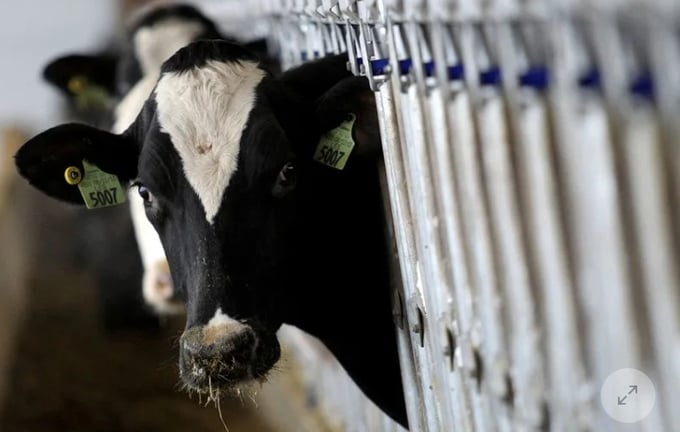November 25, 2025 | 01:07 GMT +7
November 25, 2025 | 01:07 GMT +7
Hotline: 0913.378.918
November 25, 2025 | 01:07 GMT +7
Hotline: 0913.378.918

A dairy cow stops to look up while feeding at a dairy farm in Ashland.
Federal officials are seeking to verify the safety of milk and meat after confirming the H5N1 virus in 34 dairy cattle herds in nine states since late March, and in one person in Texas.
Both the U.S. Centers for Disease Control and Prevention and the World Health Organization have said the overall public health risk is low, but is higher for those with exposure to infected animals.
Scientists believe outbreaks are more widespread in cows than officially reported based on findings of H5N1 particles in about 20% of milk samples. The U.S. Food and Drug Administration said on Friday that preliminary results of gold-standard PCR tests showed pasteurization killed the bird flu virus in milk, though.
The U.S. Department of Agriculture will analyze retail ground beef samples with PCR tests that indicate "whether any viral particles are present," and conduct two other safety studies, according to a statement. Some dairy cows are processed into ground beef when they grow old.
"USDA's additional testing is appropriate to ensure public health is protected and to stop the spread of animal disease," said Sarah Little, spokesperson for the Meat Institute, an industry group representing meat processors
USDA on Monday began requiring lactating dairy cows to test negative for bird flu before being moved across state lines as officials seek to contain the virus.
The department said this weekend that testing is not required for cows that are shipped over state lines directly to slaughter facilities from barns where they are sold. Those cattle only need documentation showing they were inspected by a veterinarian.
USDA said it inspects each animal before slaughter, and all cattle carcasses must pass inspection after slaughter to enter the human food supply.
USDA is now also collecting beef muscle samples at slaughter facilities of dairy cattle that have been condemned to determine the presence of viral particles, according to the statement. Any positive PCR tests for retail or slaughter samples will be evaluated for live virus, the USDA said.
Last week, USDA said it had found bird flu in a lung tissue sample from an asymptomatic dairy cow that was sent to slaughter from an infected herd. The animal did not enter the food supply, according to the department.
In another safety study, USDA will cook ground beef containing a "virus surrogate" at different temperatures to assess how it inactivates the virus, according to the statement. It said cooking meat to a safe internal temperature kills bacteria and viruses.
Colombia restricted the import of beef and beef products coming from U.S. states where dairy cows have tested positive for avian influenza as of April 15, according to the USDA.
There are no known cases of bird flu in beef cattle so far.
The human case in the current outbreak was in a Texas farm worker who suffered conjunctivitis following exposure to dairy cows.
(Reuters)

(VAN) Brazil's COP30 presidency pushed through a compromise climate deal on Saturday that would boost finance for poor nations coping with global warming but that omitted any mention of the fossil fuels driving it.

(VAN) Poultry farmers in the UK have been warned that they could face one of the worst winters yet for bird flu.

(VAN) Prices of main-crop paddy have risen sharply, with jasmine rice hitting 16,100 baht per tonne — the highest level in years.

(VAN) In Brazil, FAO unveiled a series of reports and initiatives showing how sustainable agrifood systems are a solution to the climate crisis.

(VAN) With names like neodymium and dysprosium, rare-earth elements sound exotic — and their perceived scarcity has only added to the mystique.

(VAN) In a new study published in Trends in Biotechnology, researchers used a gene-editing technology called CRISPR to increase a fungus's production efficiency and cut its production-related environmental impact by as much as 61%- all without adding any foreign DNA.

(VAN) A top official in Beijing’s Cop delegation says China is committed to clean energy – but US’s absence is a problem.